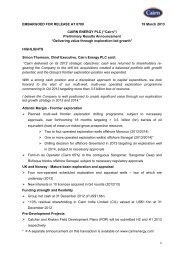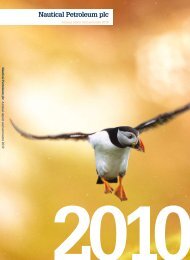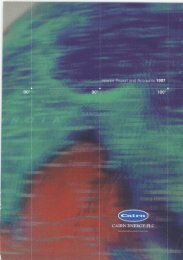Annual Report 2007 in PDF - Cairn Energy PLC
Annual Report 2007 in PDF - Cairn Energy PLC
Annual Report 2007 in PDF - Cairn Energy PLC
You also want an ePaper? Increase the reach of your titles
YUMPU automatically turns print PDFs into web optimized ePapers that Google loves.
DIRECTORS’ REPORT<br />
CONTINUED<br />
Age of Directors on Appo<strong>in</strong>tment<br />
The Current Articles conta<strong>in</strong> a provision limit<strong>in</strong>g the age at which a director can be appo<strong>in</strong>ted. Such provision could now fall<br />
foul of the Employment Equality (Age) Regulations 2006 and so has been removed <strong>in</strong> the New Articles.<br />
Retirement of Directors by Rotation<br />
The Current Articles conta<strong>in</strong> a provision requir<strong>in</strong>g a m<strong>in</strong>imum number of one third of the directors who are subject to<br />
retirement by rotation to retire at every AGM. Such provision is no longer appropriate <strong>in</strong> view of the Comb<strong>in</strong>ed Code<br />
requirement for directors to offer themselves for re-election at regular <strong>in</strong>tervals and at least every three years and so has been<br />
removed <strong>in</strong> the New Articles. The New Articles provide that any director who has been appo<strong>in</strong>ted by the Board s<strong>in</strong>ce the last<br />
AGM, or who held office at the time of the two preced<strong>in</strong>g AGMs and who did not retire at either of them, or who has held office<br />
for a cont<strong>in</strong>uous period of n<strong>in</strong>e years or more at the date of the AGM, is to retire at each AGM and, if he wishes to do so, offer<br />
himself for re-appo<strong>in</strong>tment.<br />
Conflicts of Interest<br />
The Companies Act 2006 sets out directors’ general duties which largely codify the exist<strong>in</strong>g law but with some changes.<br />
Under the Companies Act 2006, from 1 October 2008, a director must avoid a situation where he has, or can have, a direct or<br />
<strong>in</strong>direct <strong>in</strong>terest that conflicts, or possibly may conflict with the company’s <strong>in</strong>terests. The requirement is very broad and could<br />
apply, for example, if a director becomes a director of another company or trustee of another organisation. The Companies Act<br />
2006 allows directors of public companies to authorise conflicts and potential conflicts, where appropriate, where the articles<br />
of association conta<strong>in</strong> a provision to this effect. The Companies Act 2006 also allows the articles of association to conta<strong>in</strong> other<br />
provisions for deal<strong>in</strong>g with directors’ conflicts of <strong>in</strong>terest to avoid a breach of duty. The New Articles give the directors authority<br />
to approve such situations and to <strong>in</strong>clude other provisions to allow conflicts of <strong>in</strong>terest to be dealt with <strong>in</strong> a similar way to the<br />
current position.<br />
There are safeguards which will apply when directors decide whether to authorise a conflict or potential conflict. Firstly,<br />
only directors who have no <strong>in</strong>terest <strong>in</strong> the matter be<strong>in</strong>g considered will be able to take the relevant decision, and secondly,<br />
<strong>in</strong> tak<strong>in</strong>g the decision the directors must act <strong>in</strong> a way they consider, <strong>in</strong> good faith, will be most likely to promote the company’s<br />
success. The directors will be able to impose conditions, limitations and/or terms when giv<strong>in</strong>g authorisation if they th<strong>in</strong>k this<br />
is appropriate.<br />
The New Articles also conta<strong>in</strong> provisions relat<strong>in</strong>g to confidential <strong>in</strong>formation, attendance at Board meet<strong>in</strong>gs and availability of<br />
Board papers to protect a director be<strong>in</strong>g <strong>in</strong> breach of duty if a conflict of <strong>in</strong>terest or potential conflict of <strong>in</strong>terest arises. These<br />
provisions will only apply where the position giv<strong>in</strong>g rise to the potential conflict has previously been authorised by the directors.<br />
Electronic and Web Communications<br />
Provisions of the Companies Act 2006 which came <strong>in</strong>to force <strong>in</strong> January <strong>2007</strong> enable companies to communicate with<br />
members by electronic and/or website communications. The New Articles cont<strong>in</strong>ue to allow communications to members <strong>in</strong><br />
electronic form and, <strong>in</strong> addition, they also permit the Company to take advantage of the new provisions relat<strong>in</strong>g to website<br />
communications. Before the Company can communicate with a member by means of website communication, the relevant<br />
member must be asked <strong>in</strong>dividually by the Company to agree that the Company may send or supply documents or <strong>in</strong>formation<br />
to him by means of a website, and the Company must either have received a positive response or have received no response<br />
with<strong>in</strong> the period of 28 days beg<strong>in</strong>n<strong>in</strong>g with the date on which the request was sent. The Company will notify the member (either<br />
<strong>in</strong> writ<strong>in</strong>g, or by other permitted means) when a relevant document or <strong>in</strong>formation is placed on the website and a member can<br />
always request a hard copy version of the document or <strong>in</strong>formation.<br />
Directors’ Indemnities and Loans to Fund Expenditure<br />
The Companies Act 2006 has <strong>in</strong> some areas widened the scope of the powers of a company to <strong>in</strong>demnify directors and to fund<br />
expenditure <strong>in</strong>curred <strong>in</strong> connection with certa<strong>in</strong> actions aga<strong>in</strong>st directors. The exist<strong>in</strong>g exemption allow<strong>in</strong>g a company to provide<br />
money for the purpose of fund<strong>in</strong>g a director’s defence <strong>in</strong> court proceed<strong>in</strong>gs now expressly covers regulatory proceed<strong>in</strong>gs and<br />
applies to associated companies. The New Articles reflect these new provisions.<br />
General<br />
Generally, the opportunity has been taken to br<strong>in</strong>g clearer language <strong>in</strong>to the New Articles and <strong>in</strong> some areas to conform the<br />
language of the New Articles.<br />
Disclosure of Information to Auditors<br />
The directors of the Company who held office at 31 December <strong>2007</strong> confirm that, as far as they are aware, there is no<br />
relevant audit <strong>in</strong>formation of which the Company’s auditors are unaware. In mak<strong>in</strong>g this confirmation, the directors have taken<br />
appropriate steps to make themselves aware of the relevant audit <strong>in</strong>formation and that the Company’s auditors are aware of this<br />
<strong>in</strong>formation.<br />
CAIRN ENERGY <strong>PLC</strong> ANNUAL REPORT <strong>2007</strong> 55

















